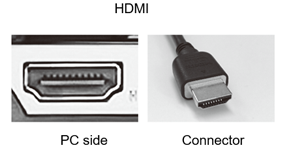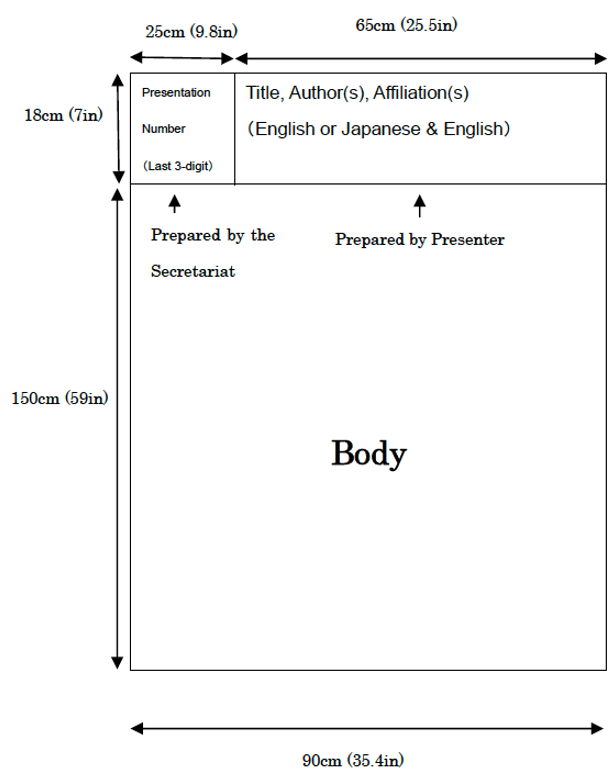Information For Chairpersons and Presenters
Concerning Use of Color in Presentation Materials
Approximately 5% of Japanese men and 8% Caucasian men have a specific type of vision that makes it difficult to distinguish between colors in a particular range, including red and green. In light of this, you are requested to take the following points into account when preparing presentation materials.
- Images of two-color staining or DNA chips should be displayed in green and magenta, not in red and green.
- Three or more strains should be displayed not only as composites containing all three colors but also with two most important colors shown alone in green and magenta. (Alternatively, images of each channel can be displayed separately.)
- In graphs and explanatory figures, it is extremely difficult to match colors shown in two separate places. For this reason, do not use only color-coded descriptions or legends for different items but also write them directly into figures. Do not differentiate between items by using different colors, but rather with different types of lines, shapes/symbols, or various types of hatching.
- On a dark background, please use white, yellow, or orange letters rather than thin, red or blue ones as much as possible.
1. For Organizers / Chairpersons
1. Arrival
Please arrive at the session room at least 15 minutes before the session and visit the Operating Desk (located at the front, right-hand side of the room) to inform meeting staff of your arrival.
2. Punctuality and Timing
Organizers and chairpersons are expected to ensure all presentations start and end punctually as scheduled.
If there are any changes in the program, please inform the meeting staff in the session room. Meeting staff will assist with timing. Please let them know if you have any requests on reminder bells. The bells will be sounded as follows unless there is no request:
ONE ring: 2 minutes remaining
TWO rings: End of presentation and start of discussion
THREE rings: End of discussion. Allotted time is up.
2. For Presenters of Symposia
1. Language
2. Time
The organizer will determine the presentation and discussion time for each speaker. The Meeting Secretariat will inform each symposium speaker of their presentation time one week before the meeting.
3. Presentation Instrument
Presentations are restricted to electrical presentations using your own laptop computer.
(Please refer to “Technical requirements for your laptop”.)
You can use a laser pointer equipped with the session room.
4. Preview
Bring your computer to the “Preview Desk” in the session room 20 minutes before your session.
5. Audio Output
Audio output is not available
3. For Oral Presenters
1. Language
Japanese or English (by presenter’s choice)
2. Presentation Time
Time allocation: 10 minutes per presentation (8minutes for presentation, 2minutes for discussion)
Meeting staff will inform presenters of the time with bell signals. The bells will be sounded as follows:
| ONE ring | 2 minutes remaining | 6 minutes passed |
| TWO rings | End of presentation and start of discussion | 8 minutes passed |
| THREE rings | End of discussion. Allotted time is up. | 10 minutes passed |
3. Presentation Instrument
Presentations are restricted to electrical presentations using your own laptop computer.(Please refer to “Technical requirements for your laptop”.)
You can use a laser pointer in the session room.
4. Preview
Bring your computer to the “Preview Desk” in the presentation room 20 minutes before your presentation
5. Audio Output
Audio output is not available
【Technical Requirements for Your Laptop Computer】
① Ensure that your computer is equipped with the proper monitor connector (HDMI) as shown below. If your computer does not have one of these connections, please bring an appropriate converter with you.

② Be sure to bring an AC adaptor. Please note that the voltage in Japan is 100V and the frequency ranges 50-60 Hz, depending on the area (50Hz in Yokohama). The socket is type A, which has two flat plug holes. If your laptop is not convertible, transformers and/or plug adapters are necessary.
③ The screen size of the presentation slide is 16:9.
④ Please deactivate the screensaver and power saving mode of your laptop.
⑤ A display, computer mouse, and keyboard will be prepared on the podium for you to operate by yourself.
6. Young Scientist Award
The Young Scientist Award will be selected from oral presentations made by those who applied for this award.
Applicant eligibility: students or those who earned a bachelor’s degree, master’s degree, or PhD within 3 years.
The winners will be judged by oral presentations on the day of the conference, and the winners will be posted on the conference website later.
7.FEBS OPEN BIO Award
This award is presented to applicants for the Young Scientist Award.
The selection process consists of a Primary Review (abstract content) and a Final Review (oral presentation on the day).
Outstanding presenters in the Final Review will be honored on the last day of the meeting.
Award Ceremony:
November 5 (Wed) 15:00–15:15 Poster Venue (Event Hall)
4. For Poster Presenters
1. Language
Japanese or English (by presenter’s choice)
2. Venue
Event Hall, New Hall, Kyoto International Conference Center
3. Timeline of posting, presentation, discussion, and removal
Each poster will be displayed for one day only. Please set up your poster on the morning of your scheduled presentation day. During your session, kindly wear a yellow ribbon on your chest and stand in front of your poster panel to facilitate discussion. Posters must be removed during the designated removal time.
| Date | Nov 3 | Nov 4 | Nov 5 | |
| Posting | 8:30- 9:00 | |||
| Presentation / Discussion | Odd No. | 11:00-11:45 | 15:00-15:45 | 15:00-15:45 |
| Even No. | 11:45-12:30 | 15:45-16:30 | 15:45-16:30 | |
| High School Student | 11:00-12:30 | |||
| Removal | 16:30-17:00 | |||
4. Poster Guidelines
The last 3-digit number of presentation numbers is shown at the upper left corner of each panel. Please find your number and put up your poster.
Tacks for putting up posters will be prepared at each panel. See the “Access & Maps” page to find your panel location.
Poster Panel Size: W90cm x H150cm (W35.4in x H59in)
Indicate your presentation title, author(s), and affiliation(s) at the top of the poster.
The letter size of these should be large enough to be clearly read at least 5m (16.4ft) away.
Text on the poster body should be written large enough to be read 2m (6.5ft) away.
Illustrations and charts should be shown as large as possible.
Place a small circle mark on the left of the presenter’s name.
Presentation and discussion can be made in either Japanese or English at the presenter’s choice. For posters written in Japanese, please indicate title, author(s), and affiliation(s) in English as well.
Remove your poster when the poster session time is over. The Secretariat will not keep or return posters.

Hitotsubashi Bekkan 4F, 2-4-4, Hitotsubashi, Chiyoda-ku, Tokyo 101-0003 , Japan
(c/o A & E Planning, Co., Ltd)
Head Office of the Japanese Biochemical Society
TEL:03-3815-1913 FAX:03-3815-1934
E-mail:jbs-ho@jbsoc.or.jp
URL:https://www.jbsoc.or.jp/



